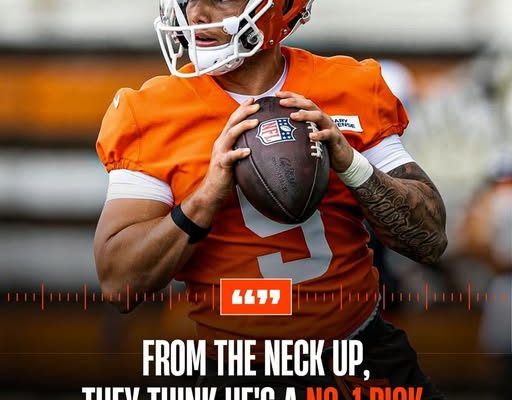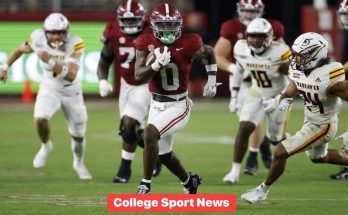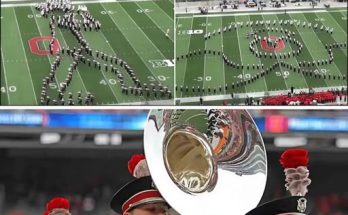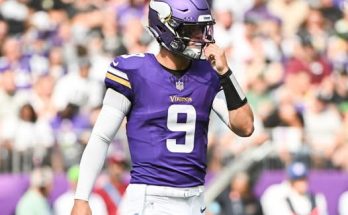In the ever-evolving world of NFL quarterback development, franchises are constantly seeking players who possess not only the physical tools to succeed at the highest level but the mental capacity to lead, adapt, and thrive in complex systems. For the Cleveland Browns, a team that has long searched for stability under center, the intrigue surrounding rookie quarterback Dillon Gabriel is both a calculated gamble and a hopeful turn in their ongoing quest to find the right fit. Browns insider Tony Grossi recently shared a significant insight that has since echoed through the halls of NFL analysis: “They are intrigued with Dillon Gabriel. They think from the neck up, he’s a No. 1 pick.”
That quote, brief as it may be, reveals volumes about the Browns’ internal evaluation process and where Gabriel fits within their blueprint. In today’s league, quarterbacking is as much about processing information, reading defenses, managing game tempo, and leading with poise under duress as it is about arm strength and athleticism. The Browns’ coaching staff, scouts, and front office are clearly seeing something special in the way Gabriel carries himself intellectually and emotionally—qualities that cannot be coached but are necessary for long-term success in the NFL.
Dillon Gabriel’s collegiate résumé reads like that of a hardened veteran. Transferring from UCF to Oklahoma and experiencing different offensive systems under multiple coaching regimes, Gabriel displayed adaptability and maturity beyond his years. He’s been known as a student of the game, someone who absorbs playbooks quickly, asks the right questions, and internalizes the details of his role. That kind of intellectual sharpness, according to Grossi, is what has caught the Browns’ attention more than anything. In their eyes, “from the neck up,” Gabriel carries the pedigree of a franchise quarterback—even if he wasn’t selected at the top of the draft.
While the NFL has historically been enamored with size, speed, and cannon arms, recent years have emphasized that mental processing, anticipation, and poise under pressure are often more predictive of success. Players like Brock Purdy, Jalen Hurts, and even Joe Burrow have helped shift that narrative. The Browns, perhaps finally aligning with that trend, seem to believe that Gabriel’s strengths lie in his cognitive and leadership traits. Despite being considered undersized by some scouts and not possessing elite arm talent, Gabriel brings a disciplined approach to reading coverages, executing progressions, and mastering pre-snap responsibilities. He’s the kind of quarterback who doesn’t just memorize plays—he understands why they work.
The phrase “from the neck up, he’s a No. 1 pick” is a massive compliment in scouting circles. It suggests that while Gabriel may not check every box physically, he could be the kind of quarterback who wins with his mind—a cerebral commander who knows how to manipulate safeties, recognize disguised blitzes, and make the right call in critical moments. That’s the kind of thinking that helped Tom Brady become the most successful quarterback of all time despite being drafted in the sixth round. In a league where game plans grow more intricate by the week and defenses evolve in real time, mental sharpness becomes an invaluable asset.
What makes Gabriel’s situation particularly fascinating is the environment into which he enters in Cleveland. The Browns already have Deshaun Watson on a massive contract and high expectations surrounding his performance in the coming seasons. They’ve built an offense that balances run-game physicality with vertical threats and rely heavily on timing, rhythm, and decision-making. Gabriel, for now, is not expected to unseat Watson, but the fact that the Browns are this intrigued with a rookie quarterback suggests they are building contingency plans—or, at the very least, investing in a development project with long-term upside.
This isn’t the first time the Browns have shown interest in quarterbacks with strong football IQs, but their history has been marked by missteps and inconsistency. From Johnny Manziel’s off-field distractions to Baker Mayfield’s up-and-down tenure, Cleveland’s quarterback experiments have often flamed out, not because of raw ability but due to a lack of stability, discipline, and long-term vision. The Gabriel pick, in contrast, appears to be less about instant impact and more about investing in a prospect whose game might translate better with time and coaching.
It also speaks volumes about how much the organization has evolved in its scouting philosophy. Rather than chasing hype or relying solely on traditional quarterback archetypes, the Browns are prioritizing decision-making, maturity, and coachability. Gabriel’s film shows a player who can distribute efficiently, make decisive throws in quick windows, and rally his offense. He’s rarely rattled, even when the protection breaks down. At Oklahoma, he was tasked with running a high-tempo, spread offense, but he also showed he could make anticipatory throws in the middle of the field—often the truest test of a quarterback’s mental wiring.
The Browns’ offensive staff has reportedly been pleased with how quickly Gabriel has picked up the playbook. During offseason training activities and mini-camps, he demonstrated not only a firm grasp of the system but an ability to correct mistakes on the fly. Coaches have privately praised his presence in the film room, his willingness to take coaching, and his inquisitive nature. He asks the kinds of questions that show he’s not just trying to memorize assignments—he’s trying to master the game.
There’s also a competitive fire in Gabriel that, while not always vocal, manifests in how he approaches preparation and execution. Teammates have noted that he operates with a quiet intensity, focused on maximizing every rep whether it’s with the first team or third string. That kind of demeanor bodes well in a league that grinds down those who lack resilience. Gabriel’s journey—from being overlooked as a high school prospect to earning the trust of elite programs in college, and now being seen as a future asset by an NFL franchise—is one of persistence and growth.
The fact that Grossi emphasized the Browns’ excitement “from the neck up” could also hint at what role Gabriel may carve out early in his career. In many organizations, rookie quarterbacks often begin as scout team leaders, helping simulate opposing offenses in practice. That role, however limited it may seem, is critical to a team’s weekly preparation and offers young quarterbacks a chance to impress with their understanding of the game. If Gabriel becomes a trusted asset in that realm, it will only accelerate his path toward more significant opportunities down the line.
It also shouldn’t be overlooked that Cleveland’s offensive coordinator and quarterback coaches have a track record of developing talent. If Gabriel is surrounded by the right teaching and allowed to grow at his pace, the Browns could be cultivating one of the league’s better-kept secrets. Every year, players emerge from the middle or back of the draft to become key contributors simply because they were given the right runway to evolve. Gabriel seems to fit that mold, especially given the intangible qualities the Browns are already lauding.



